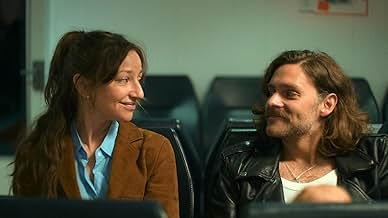Eine Ärztin und ein Krankenpfleger treffen sich zufällig auf einer Fähre in Oslo. Als er erzählt, dass er seine Nächte oft auf der Fähre verbringt, um schnellen Sex zu haben, überlegt sie, o... Alles lesenEine Ärztin und ein Krankenpfleger treffen sich zufällig auf einer Fähre in Oslo. Als er erzählt, dass er seine Nächte oft auf der Fähre verbringt, um schnellen Sex zu haben, überlegt sie, ob das nicht auch eine Option für sie sein könnte.Eine Ärztin und ein Krankenpfleger treffen sich zufällig auf einer Fähre in Oslo. Als er erzählt, dass er seine Nächte oft auf der Fähre verbringt, um schnellen Sex zu haben, überlegt sie, ob das nicht auch eine Option für sie sein könnte.
- Regie
- Drehbuch
- Hauptbesetzung
- Auszeichnungen
- 2 Gewinne & 7 Nominierungen insgesamt
Empfohlene Bewertungen
"Love" is the second film I saw from the Oslo trilogy of Dag Johan Haugerud after "Sex" (2024). It is not entirely clear if "Love" was meant as the second or the third episode, but given the fact that the films can be seen indepedently it doesn't matter that much.
There are many similarities with "Sex". Both films heavily depend on dialogues and alternate this with beautiful pictures of the city of Oslo. In comparison with "Sex" the dialogues are less artificial and the images of Oslo are even more beautiful. In my opinion "Love" is the better film, but I suspect not every one does appreciate this film. In my local arthouse cinema the film was only shown for two weeks.
Central point in the story is the ferry between the city of Oslo and the peninsula of Nesodden. This ferry is used heavily by commuters but the homosexual Tor (Tayo Cittadella Jacobsen) uses it also to "cruise" for (sexual) encounters using a dating app. One day he meets his (heterosexual) boss Marianna (Andrea Bræin Hovig) at this ferry. He explains the concept of "cruising" to her and, also being single, she decides to give it a try.
In my opinion the theme of the movie is the way the homosexual and heterosexual main characters look at their love / sex life and in particular at the relationship between the two. Starting with the preconception that homosexuals are more promiscuous and putting more emphasis on sex than on love the reality turns out to be quitte different, the female main character having lots of trouble overcoming her fear of commitment. The heading of the review of "Love" in my newspaper was, and not without reason, "What heterosexuals can learn from gays".
"Love" undeniably has an element of gay cinema, but unlike so many other gay films it does not portray gay life as problematic or gays invariably being victims of discrimination. In "Love" there is much tolerance for sexual minorities. In an interview director Dag Johan Haugerud was not very pleased when the journalsit called him the queer Ingmar Bergman. I suspect this had to do with the somewhat gloomy image of Bergman. Haugerud would be much more happy if compared with Eric Rohmer.
In my opinion "Love" is better than "Sex", but it is not a perfect film. There is a third character (Heidi played by Marte Engebrigtsen) and her scenes don't come out very well. This applies to the last musical scene (unconvincing just like the last musical scene of "Sex") as well as the first introductory scene. In this scene Heidi interprets the statues on the exterior walls of the Oslo City Hall. This interpretation is in my opinion too moralistic. In the rest of the movie Tor and Marianne illustrate more or less the same philosophy of tolerance in a much more nuanced way.
The interpretation of Heidi of the statues is meant to be part of the festivities surrounding Oslo's 100th anniversary. This puzzled me a little bit. Is Oslo only 100 years old? Some internet research made it clear to me that the city is nearly 1000 years old but had a different name (Kristiania) between 1624 and 1925.
There are many similarities with "Sex". Both films heavily depend on dialogues and alternate this with beautiful pictures of the city of Oslo. In comparison with "Sex" the dialogues are less artificial and the images of Oslo are even more beautiful. In my opinion "Love" is the better film, but I suspect not every one does appreciate this film. In my local arthouse cinema the film was only shown for two weeks.
Central point in the story is the ferry between the city of Oslo and the peninsula of Nesodden. This ferry is used heavily by commuters but the homosexual Tor (Tayo Cittadella Jacobsen) uses it also to "cruise" for (sexual) encounters using a dating app. One day he meets his (heterosexual) boss Marianna (Andrea Bræin Hovig) at this ferry. He explains the concept of "cruising" to her and, also being single, she decides to give it a try.
In my opinion the theme of the movie is the way the homosexual and heterosexual main characters look at their love / sex life and in particular at the relationship between the two. Starting with the preconception that homosexuals are more promiscuous and putting more emphasis on sex than on love the reality turns out to be quitte different, the female main character having lots of trouble overcoming her fear of commitment. The heading of the review of "Love" in my newspaper was, and not without reason, "What heterosexuals can learn from gays".
"Love" undeniably has an element of gay cinema, but unlike so many other gay films it does not portray gay life as problematic or gays invariably being victims of discrimination. In "Love" there is much tolerance for sexual minorities. In an interview director Dag Johan Haugerud was not very pleased when the journalsit called him the queer Ingmar Bergman. I suspect this had to do with the somewhat gloomy image of Bergman. Haugerud would be much more happy if compared with Eric Rohmer.
In my opinion "Love" is better than "Sex", but it is not a perfect film. There is a third character (Heidi played by Marte Engebrigtsen) and her scenes don't come out very well. This applies to the last musical scene (unconvincing just like the last musical scene of "Sex") as well as the first introductory scene. In this scene Heidi interprets the statues on the exterior walls of the Oslo City Hall. This interpretation is in my opinion too moralistic. In the rest of the movie Tor and Marianne illustrate more or less the same philosophy of tolerance in a much more nuanced way.
The interpretation of Heidi of the statues is meant to be part of the festivities surrounding Oslo's 100th anniversary. This puzzled me a little bit. Is Oslo only 100 years old? Some internet research made it clear to me that the city is nearly 1000 years old but had a different name (Kristiania) between 1624 and 1925.
Kjærlighet (2024), directed by Dag Johan Haugerud, is a contemplative and emotionally charged journey that challenges societal expectations of love and intimacy. Set against the serene yet haunting backdrop of Norway, the film tells the story of Marianne, a doctor, and Tor, a nurse, who avoid traditional relationships but find themselves drawn into a connection that questions their convictions.
Andrea Bræin Hovig delivers a deeply nuanced performance as Marianne, capturing her internal conflict with remarkable subtlety. Tayo Cittadella Jacobsen's portrayal of Tor is equally compelling, balancing vulnerability with a carefree facade. Together, their chemistry creates an intimate and layered narrative that feels refreshingly authentic.
Haugerud's script is sharp and introspective, delving into the psychological and cultural aspects of human connection in a society that values independence over commitment. The pacing is deliberate, allowing the film to breathe and its themes to resonate. The cinematography is beautifully restrained, using the stark Norwegian landscapes to mirror the characters' emotional landscapes.
Kjærlighet is a film that lingers in the mind, encouraging viewers to reflect on the complexities of intimacy in an ever-changing world. It's a quiet yet powerful piece of cinema that speaks volumes through its silence.
Rating: 8/10 - A poignant, introspective film that redefines modern love.
Andrea Bræin Hovig delivers a deeply nuanced performance as Marianne, capturing her internal conflict with remarkable subtlety. Tayo Cittadella Jacobsen's portrayal of Tor is equally compelling, balancing vulnerability with a carefree facade. Together, their chemistry creates an intimate and layered narrative that feels refreshingly authentic.
Haugerud's script is sharp and introspective, delving into the psychological and cultural aspects of human connection in a society that values independence over commitment. The pacing is deliberate, allowing the film to breathe and its themes to resonate. The cinematography is beautifully restrained, using the stark Norwegian landscapes to mirror the characters' emotional landscapes.
Kjærlighet is a film that lingers in the mind, encouraging viewers to reflect on the complexities of intimacy in an ever-changing world. It's a quiet yet powerful piece of cinema that speaks volumes through its silence.
Rating: 8/10 - A poignant, introspective film that redefines modern love.
Top-Auswahl
Melde dich zum Bewerten an und greife auf die Watchlist für personalisierte Empfehlungen zu.
Details
Box Office
- Weltweiter Bruttoertrag
- 276.328 $
- Laufzeit
- 1 Std. 59 Min.(119 min)
- Farbe
Zu dieser Seite beitragen
Bearbeitung vorschlagen oder fehlenden Inhalt hinzufügen

![Trailer - [OV]](https://m.media-amazon.com/images/M/MV5BNmI4MDMxNGYtYTEwNi00M2UzLWFjNTUtMjkwY2E1Yzc3NmE2XkEyXkFqcGdeQXRyYW5zY29kZS13b3JrZmxvdw@@._V1_QL75_UX500_CR0)

























